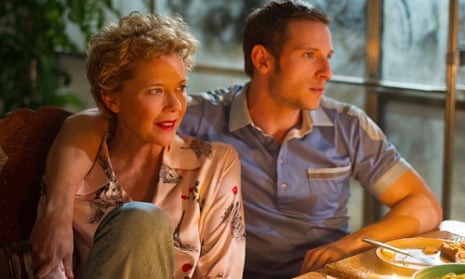There is a tremendous warmth and tenderness to this sweet, sad love story starring Annette Bening and Jamie Bell – a stranger-than-fiction true romance that unfolds in Los Angeles, New York, London and Liverpool – and there is a bittersweet rightness in a new song from Elvis Costello over the closing credits: You Shouldn’t Look at Me That Way. Director Paul McGuigan finds the balance between pathos and humour, working from Matt Greenhalgh’s adaptation of a memoir by the actor and writer Peter Turner.
As an unknown, struggling young actor in the late 70s, Turner met and fell in love with Gloria Grahame, the legendary Hollywood star and Oscar-winner who, incredibly, was living in the same north London boarding house. She was in the endgame of her career yet maintaining a never-say-die optimism, looking for stage work in Britain and suppressing worries about her health. Then, some time after their affair ended, Turner received a phone call: Grahame had collapsed in her dressing room while on tour in the UK, and had asked to come and stay with Peter and his family in Liverpool, convinced that she could recover there.
Kenneth Cranham and Julie Walters play Peter’s mum and dad and Bell is very affecting in the role of Peter, exasperated and angry with his impossible superstar ex-girlfriend, and yet still in love with her to the very last. And Bening is excellent as Grahame: imperious, vulnerable, romantic, sexually excited about her younger man, wanly aware of secrets she cannot share with him. She is not so much a Norma Desmond figure, staying big while the movies got small; she is closer to someone her mother (played by Vanessa Redgrave) compares her to: Marilyn Monroe, an actor having to stay tough while life and showbusiness give her the fuzzy end of the lollipop.
Peter and Gloria have a yearning to play Romeo and Juliet, and there is a Capulet/Montague tribal division: Brit and American, young and not-young, famous and not-famous. There is an interesting scene when Peter takes Gloria down to the local pub for a couple of pints of bitter. (90p – yowch! Pricey!) Gloria goes off to powder her nose while Peter pays for the drinks, and the landlord asks, with an air of disbelief: “Isn’t that Gloria Grahame …?” And he leaves it there. It was a pre-web age when movie history was more difficult to retrieve, when it was still possible for former film stars to go to British pubs and stay obscure, when the drinkers were not in a position to take out smartphones and tweet about her presence and watch YouTube clips. Later, you see Peter in a cinema, wonderingly watching Gloria in her glorious heyday in Naked Alibi from 25 years or so before. The lustrous and mythic black-and-white celluloid, so different from modernity’s colour, make it seem like she came from another planet.
There is a great spark between Bell and Bening, and I think these are the most relaxed performances I have seen from either of them. It is very touching when Gloria first invites Peter into her room in the middle of the day to do a little disco dancing, ostensibly because she needs someone with whom to rehearse a routine. Of course, it is a seduction, and yet there is something very innocent, and absurd, and almost childlike, about the pair of them bopping around her room. Bell taps into his Billy Elliot spirit for this, and Bening is herself no mean dancer. It’s a scene that allows us to believe in their romance, and allows us to have a romance with the pair of them.
Cranham and Walters are reliably excellent as Peter’s parents, as is Stephen Graham as his brother. Screenwriter Matt Greenhalgh has perhaps taken a decision to scale back the black-comic raucousness of the Liverpool household in which Gloria found herself at the last, preferring to emphasise gentleness and sadness rather than any how-are-the-mighty-fallen ironies. The movie makes the right decision to focus on the humanity and compassion. It’s a beguiling story and Bell and Bening are tremendous as the star-crossed lovers.

Comments (…)
Sign in or create your Guardian account to join the discussion